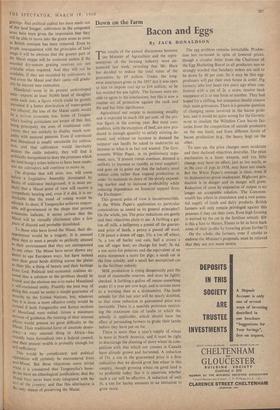Down on the Farm
Bacon and Eggs
By JACK DONALDSON
HE results of the annual discussions between
I the Minister of Agriculture and the repre- sentatives of the farming industry were an- nounced last week, revealing that Mr. Hare has decided to reduce the total value of the guarantees by £9 million. Under the long- term assurances given in the 1957 Act it was open to him to impose cuts up to £19 million; so he has wielded his axe lightly. The farmers were un- able to agree to his conclusions, but this is now a routine act of protection against the rank and file and has little significance.
Agricultural net output is increasing steadily and is expected to reach 168 per cent. of the pre- war figure in the coming year. But most com- modities, with the exception of beef, are now pro- duced in enough quantity to satisfy existing de- mand, and without an increase in demand the taxpayer can hardly be asked to underwrite an increase in what is in fact not wanted. The Gov- ernment White Paper, in its preliminary argu- ment, says, `if present trends continue, demand is unlikely to increase as rapidly as total supplies'; and goes on to point out that the industry must reduce costs rather than expand production in order 'to maintain its share of the slowly expand- ing market and to increase profitability while reducing dependence on financial support from the Exchequer.'
This general point of view is incontrovertible. Is the White Paper's application to particular commodities as sound as its general principles?
On the whole, yes. The price reductions are gentle and their objectives plain to see. A farthing a gal- lon off milk, a halfpenny a pound off the guaran- teed price of lamb, a penny a pound off wool, 1.38 pence a dozen off eggs, 15s. a ton off wheat, 5s. a ton off barley and oats, half a crown a ton off sugar beet; no change for beef; 5s. 6d. a ton more for potatoes and the equivalent of an extra ninepence a score for pigs; a small cut in the lime subsidy, and a small but unexpected cut in the fertiliser subsidy.
Milk production is rising dangerously past the level of reasonable reserves, and must be lightly checked. A farthing a gallon off means something under £1 a year per cow kept, and is serious more as a warning than as a disincentive. The lamb subsidy for this last year will be nearly doubled, so that some reduction in guaranteed price was inevitable. There is a sensible provision restrict- ing the maximum size of lambs to which the subsidy is applicable, which should have the, effect of persuading farmers to grade their lambs before they have put on fat.
There is more than a year's supply of wheat in store in North America, and it must be right to discourage the planting of more wheat in com- petition with that which our cousins in Canada have already grown and harvested. A reduction of 15s. a ton in the guaranteed price is a firm indication that we should grow less wheat in this country. though growing wheat on good land is so profitable today that it is uncertain whether such a cut will be effective. A reduction of only 5s. a ton for barley amounts to an invitation to grow more. The egg problem remains intractable. Produc- tion has increased in spite of lowered prices, though a circular letter from the Chairman of the Egg Marketing Board to all producers was so strongly worded that hatchery orders are said to be down by 40 per cent. So it may be that egg- producers will put their own house in order. Pig farmers, who lost heart two years ago when con- fronted with a cut of 2s. a score, receive back ninepence of it in one form or another. They had hoped for a shilling, but ninepence should remove their main grievances. There is a genuine question of changing tastes involved in the bacon prob- lem, and it would be quite wrong for the Govern- mmt to insulate the Wiltshire Cure bacon fac- tories from the competition of outside producers on the one hand, and from different forms of bacon production (e.g., the heavy hog) on the other.
To sum up, the price changes seem moderate and their declared objectives desirable. The price mechanism is a blunt weapon, and too little change may have no effect, just as too much, as in the case of pigs in 1958, may have too much. But the White Paper's message is clear, even if its disincentives prove inadequate. High-cost pro- duction is in danger and its danger will grow. Reduction of costs by expansion of output is no longer an acceptable solution. The Common- wealth has wheat in abundance and a vast poten- tial supply of lamb and dairy products. British farmers will only remain privileged against this pressure if they cut their costs. Even high farming is warned by the cut in the fertiliser subsidy. (Or is this a hint to Messrs. Fisons to let us have back some of their profits by lowering prices further?)
On the whole, the farmers, even if unable to endorse the Minister's proposals, must be relieved that they are not more severe.


































 Previous page
Previous page